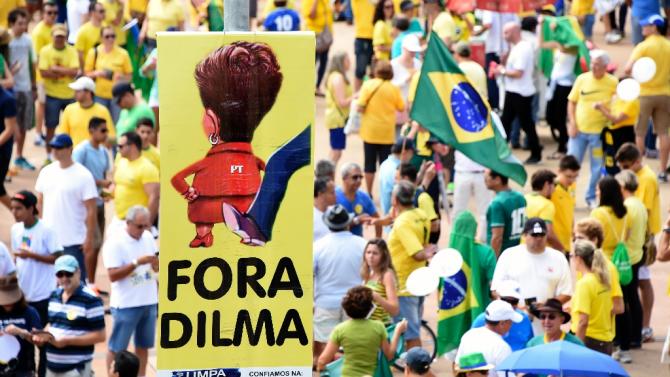Sunday, March 13, 2016
Brazil: The leftist governments, current and previous, have led to massive corruption, recession and tyranny.
Brasília (AFP) - Tens of thousands of protesters flooded the streets of Latin America's biggest country Sunday in hope of bringing down President Dilma Rousseff over corruption and a crumbling economy.
More than a million people were expected to turn out across Brazil, which will host the Summer Olympics in Rio de Janeiro in August.
Rousseff, struggling to hold on to power in the face of a massive corruption scandal and the worst recession in decades, urged demonstrators to remain peaceful.
"I am appealing for there not to be violence," the leftist president told Brazilian media late Saturday.
"I think all people have a right to be on the streets. However, no one has a right to be violent. No one."
The authorities in Sao Paulo, Brazil's biggest city and an opposition stronghold, said they were bracing for a million protesters.
At least 20,000 people gathered early in the capital Brasilia, with expectations of five times that number to come. In Rio, the crowd swelled throughout a long section of Avenida Atlantica running along the beachfront of Copacabana.
Many protesters came wearing the national football team shirt or with the yellow and green flag around their shoulders.
The mood in Rio was calm, with demonstrators singing samba tunes and the national anthem and vendors hawking coconut water and other cold drinks. But there was no disguising the depth of anger.
"I'm demonstrating today because I believe that only my participation can eventually stop the mismanagement of the country's riches," said Marcelo Antunes, 66, an engineer. "I think all Brazilians need to participate -- we can't stand aside."
Pressure from the street will be vital in the battle to topple Rousseff and her ruling Workers' Party, he added. "All revolutions in history were pushed by the masses."
"We need to get rid of Dilma, the Workers' Party, the whole lot," said Rio resident Maria do Carmo, 73, who was carrying a Brazilian flag. "It's not their time anymore."
Asked if she feared violence, she said "people don't want civil war or trouble. They just want to peacefully demonstrate."
- Power of the streets -
Rousseff -- deeply unpopular because of a giant corruption scandal centered on state oil company Petrobras and because of her management of the recession -- faces impeachment in Congress.
Her chief mentor in the leftist Workers' Party, ex-president Luiz Inacio Lula da Silva, is fighting allegations that he was part of the Petrobras corruption network.
As if that weren't enough, the PMDB party, Rousseff's crucial partner in a shaky government coalition, indicated Saturday that it could pull out in 30 days.
Demonstrators blamed Rousseff for the country's chaotic state.
"Out with Dilma, out with the demon!" some chanted in Rio.
Many protesters held placards depicting Rousseff and Lula as prisoners, while others praised the chief investigating judge in the Petrobras scandal, Sergio Moro, as "Our national pride."
"Rousseff has been a terrible president," protester Marcia Caldas, 59, said. "She destroyed the economy."
For deputies in Congress of all stripes, crowd size will be a crucial signal of whether or not to push for Rousseff's impeachment.
Opposition movements such as Go to the Streets are so well organized that anything less than a very large turnout would probably be seen as failure.
The biggest anti-government protest last year, in March, included an estimated 1.7 million people across Brazil, with a million in Sao Paulo alone. Some 1.2 million people attended another six months later.
- Power struggle -
Congress is mulling impeachment on the grounds that Rousseff allegedly manipulated government accounts so that she could illegally boost public spending during her 2014 re-election campaign.
A former leftist guerrilla tortured under Brazil's dictatorship, Rousseff insists there isn't "the slightest possibility" she will resign. But she is running out of allies as pressure builds.
Not only is the PMDB threatening to abandon her, but its leader -- her vice president Michel Temer -- has additional motivation to see impeachment go through: Under the constitution, he would become interim president.
Against that backdrop, Rousseff needs help from Lula more than ever. Although now a highly divisive figure, the former president gives Rousseff credibility with swaths of voters who remember his 2003-2010 presidency for bringing millions of Brazilians out of extreme poverty.
In the latest of a series of chess-like maneuvers with the opposition, Rousseff has said she is considering giving Lula a ministerial post.
That would put him out of reach of regular criminal courts because sitting politicians can be judged only in the Supreme Court.
However, Lula is said to be reluctant given that such a move would make him even more hated among the opposition, escalating the power struggle.
Subscribe to:
Post Comments (Atom)















No comments:
Post a Comment